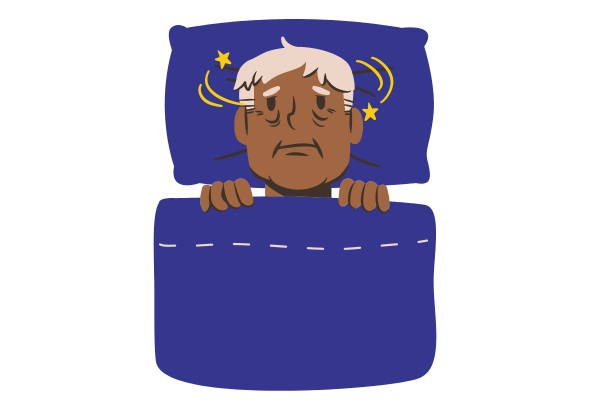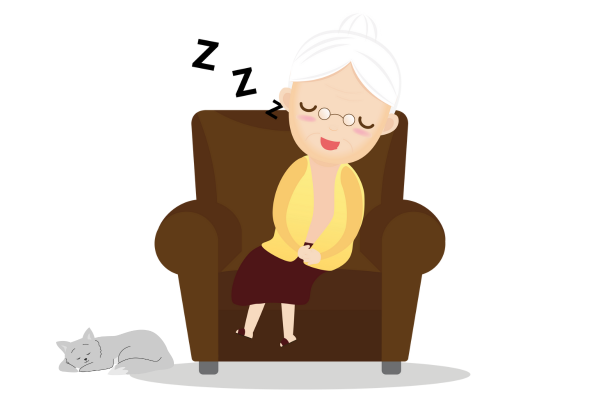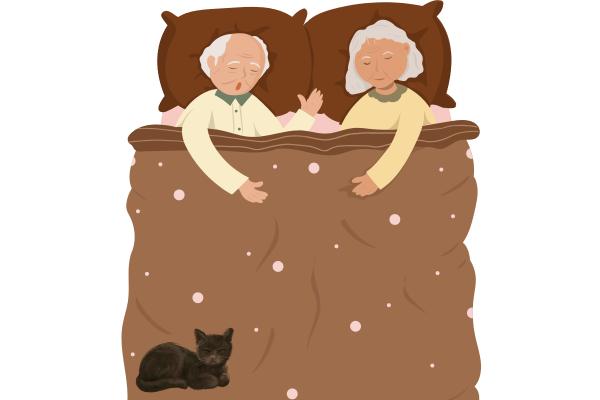The Importance of Sleep: How to Improve Your Sleep Quality in Your 50s – By Bhanuka – eLanka

Sleep is a fundamental pillar of health and well-being, yet it often becomes elusive as we age. For those in their 50s, getting a good night’s sleep can be more challenging due to various physiological and lifestyle changes. This comprehensive guide will delve into the importance of sleep, explore the factors affecting sleep quality in your 50s, and provide practical tips and strategies to improve your sleep.
Why Sleep is Crucial for Health
1. Physical Health
Sleep plays a vital role in maintaining physical health. During sleep, the body undergoes crucial repair and rejuvenation processes. Adequate sleep supports immune function, reduces the risk of chronic diseases such as heart disease and diabetes, and promotes healthy weight management.
2. Mental Health
Good sleep is essential for cognitive function and mental health. It enhances memory consolidation, learning, problem-solving skills, and emotional regulation. Lack of sleep is associated with mood disorders, depression, and anxiety.
3. Hormonal Balance
Sleep helps regulate hormones that control appetite, stress, and growth. Disruptions in sleep can lead to imbalances, affecting overall health and well-being. For instance, poor sleep can increase the production of ghrelin (the hunger hormone) and decrease leptin (the satiety hormone), leading to weight gain.
Factors Affecting Sleep Quality in Your 50s
1. Hormonal Changes
As men and women age, hormonal fluctuations can significantly impact sleep. For women, menopause and the associated decline in estrogen and progesterone can lead to hot flashes, night sweats, and insomnia. For men, lower levels of testosterone can also affect sleep quality.
2. Medical Conditions
Chronic conditions such as arthritis, back pain, heart disease, and respiratory disorders can cause discomfort and disrupt sleep. Additionally, conditions like sleep apnea, restless leg syndrome, and periodic limb movement disorder become more common with age and can severely impact sleep.
3. Medication Side Effects
Many people in their 50s take medications for various health conditions, and some of these medications can interfere with sleep. Beta-blockers, antidepressants, and corticosteroids are examples of medications that can disrupt sleep patterns.
4. Lifestyle Factors
Changes in lifestyle and daily routines can affect sleep. Increased stress from work, financial concerns, or caregiving responsibilities can lead to poor sleep. Additionally, a less active lifestyle can contribute to difficulties in falling asleep and staying asleep.
Strategies to Improve Sleep Quality
1. Establish a Consistent Sleep Schedule
One of the most effective ways to improve sleep quality is to establish a consistent sleep schedule. Go to bed and wake up at the same time every day, even on weekends. This helps regulate your body’s internal clock and makes it easier to fall asleep and wake up naturally.
2. Create a Relaxing Bedtime Routine
Develop a pre-sleep routine to signal to your body that it is time to wind down. This could include activities such as reading, taking a warm bath, or practicing relaxation techniques like deep breathing or meditation. Avoid stimulating activities, such as watching TV or using electronic devices, at least an hour before bed.
3. Optimize Your Sleep Environment
Create a sleep-friendly environment in your bedroom. Ensure that your bedroom is cool, quiet, and dark. Use earplugs, an eye mask, or a white noise machine if necessary. Invest in a comfortable mattress and pillows that provide adequate support.
4. Be Mindful of Food and Drink
What you eat and drink can affect your sleep. Avoid large meals, caffeine, and alcohol close to bedtime. While alcohol might make you feel sleepy initially, it can disrupt your sleep cycle and lead to fragmented sleep.
5. Stay Physically Active
Regular physical activity can promote better sleep. Aim for at least 30 minutes of moderate exercise most days of the week. However, avoid vigorous exercise close to bedtime, as it can be stimulating and make it harder to fall asleep.
6. Manage Stress and Anxiety
Chronic stress and anxiety can interfere with sleep. Practice stress management techniques such as mindfulness, meditation, or yoga. Consider keeping a journal to write down worries or thoughts that might be keeping you awake.
7. Limit Naps
While napping can be a good way to recharge, long or irregular napping during the day can negatively affect nighttime sleep. If you need to nap, try to limit it to 20-30 minutes and avoid napping late in the day.
8. Exposure to Natural Light
Exposure to natural light during the day helps regulate your circadian rhythm. Try to spend time outside in natural sunlight, especially in the morning. In the evening, limit exposure to bright artificial lights, especially blue light from screens.

Addressing Sleep Disorders
1. Sleep Apnea
Sleep apnea is a common disorder where breathing repeatedly stops and starts during sleep. Symptoms include loud snoring, gasping for air during sleep, and excessive daytime sleepiness. If you suspect you have sleep apnea, consult a healthcare professional. Treatments may include lifestyle changes, continuous positive airway pressure (CPAP) therapy, or surgery.
2. Restless Legs Syndrome (RLS)
RLS causes uncomfortable sensations in the legs and an irresistible urge to move them. Symptoms often occur in the evening and can disrupt sleep. Treatment options include medications, lifestyle changes, and addressing underlying conditions such as iron deficiency.
3. Insomnia
Insomnia is characterized by difficulty falling asleep, staying asleep, or waking up too early. Cognitive-behavioral therapy for insomnia (CBT-I) is an effective treatment that focuses on changing sleep habits and attitudes. Medications may also be prescribed, but they are typically recommended for short-term use.

The Role of Diet in Sleep Quality
1. Foods That Promote Sleep
Certain foods can help promote sleep. These include:
- Complex Carbohydrates: Whole grains, oats, and brown rice can increase serotonin levels, promoting sleep.
- Lean Proteins: Turkey, chicken, and fish contain tryptophan, an amino acid that can help induce sleep.
- Fruits and Vegetables: Cherries, bananas, kiwis, and leafy greens can improve sleep quality due to their high content of vitamins and minerals.
- Nuts and Seeds: Almonds, walnuts, and flaxseeds are good sources of magnesium and melatonin, which support sleep.
2. Foods to Avoid
To improve sleep quality, avoid the following foods close to bedtime:
- Caffeine: Found in coffee, tea, chocolate, and some medications, caffeine can interfere with sleep.
- Spicy Foods: Can cause heartburn and disrupt sleep.
- High-Sugar Foods: Can lead to blood sugar spikes and crashes, affecting sleep.
- Heavy or Fatty Foods: Can cause indigestion and discomfort, making it harder to sleep.
The Impact of Technology on Sleep
1. Blue Light Exposure
The blue light emitted by screens on phones, tablets, and computers can interfere with the production of melatonin, the hormone that regulates sleep. Limit screen time in the hour leading up to bedtime and consider using blue light filters on your devices.
2. Digital Detox
A digital detox can improve sleep quality. Create a tech-free zone in your bedroom and establish a curfew for digital devices. Engage in offline activities such as reading a book or practicing relaxation techniques before bed.
Hormonal Changes and Sleep
1. Menopause and Sleep
For women, menopause can significantly affect sleep due to hormonal changes. Hot flashes and night sweats are common symptoms that can disrupt sleep. To manage these symptoms, consider lifestyle changes such as maintaining a cool sleeping environment, wearing lightweight pajamas, and using breathable bedding. Hormone replacement therapy (HRT) and other medications may also be an option for some women.
2. Testosterone and Sleep
In men, declining testosterone levels can affect sleep. Symptoms may include decreased sleep efficiency, increased awakenings, and reduced deep sleep. Maintaining a healthy lifestyle, including regular exercise and a balanced diet, can help mitigate these effects. In some cases, testosterone replacement therapy may be considered.
Sleep Hygiene: Best Practices
1. Keep a Sleep Diary
Tracking your sleep patterns can help identify factors that may be affecting your sleep. Note the time you go to bed, the time you wake up, any nighttime awakenings, and how you feel in the morning. This information can be valuable when discussing sleep issues with a healthcare professional.
2. Limit Alcohol and Tobacco
While alcohol may initially make you feel sleepy, it can disrupt the sleep cycle and reduce sleep quality. Tobacco, particularly nicotine, is a stimulant that can interfere with sleep. Reducing or eliminating these substances can improve sleep quality.
3. Comfortable Sleep Environment
Ensure your bedroom is conducive to sleep. This includes having a comfortable mattress and pillows, keeping the room cool and dark, and minimizing noise. Consider using blackout curtains, earplugs, or a white noise machine if necessary.
The Connection Between Mental Health and Sleep
1. Depression and Anxiety
Mental health conditions such as depression and anxiety can significantly impact sleep. These conditions often cause difficulty falling asleep, staying asleep, or waking up too early. Addressing mental health through therapy, medication, or lifestyle changes can improve sleep quality.
2. Relaxation Techniques
Practicing relaxation techniques can help reduce stress and anxiety, promoting better sleep. Techniques such as progressive muscle relaxation, guided imagery, and deep breathing can be effective. Consider incorporating these practices into your bedtime routine.
Professional Help for Sleep Issues
1. When to See a Doctor
If you consistently have trouble sleeping or if sleep problems are affecting your daily life, it may be time to see a doctor. A healthcare professional can help identify underlying causes and recommend appropriate treatments.
2. Sleep Studies
In some cases, a sleep study may be recommended to diagnose sleep disorders such as sleep apnea or restless legs syndrome. These studies are typically conducted in a sleep center and involve monitoring various physiological parameters during sleep.







